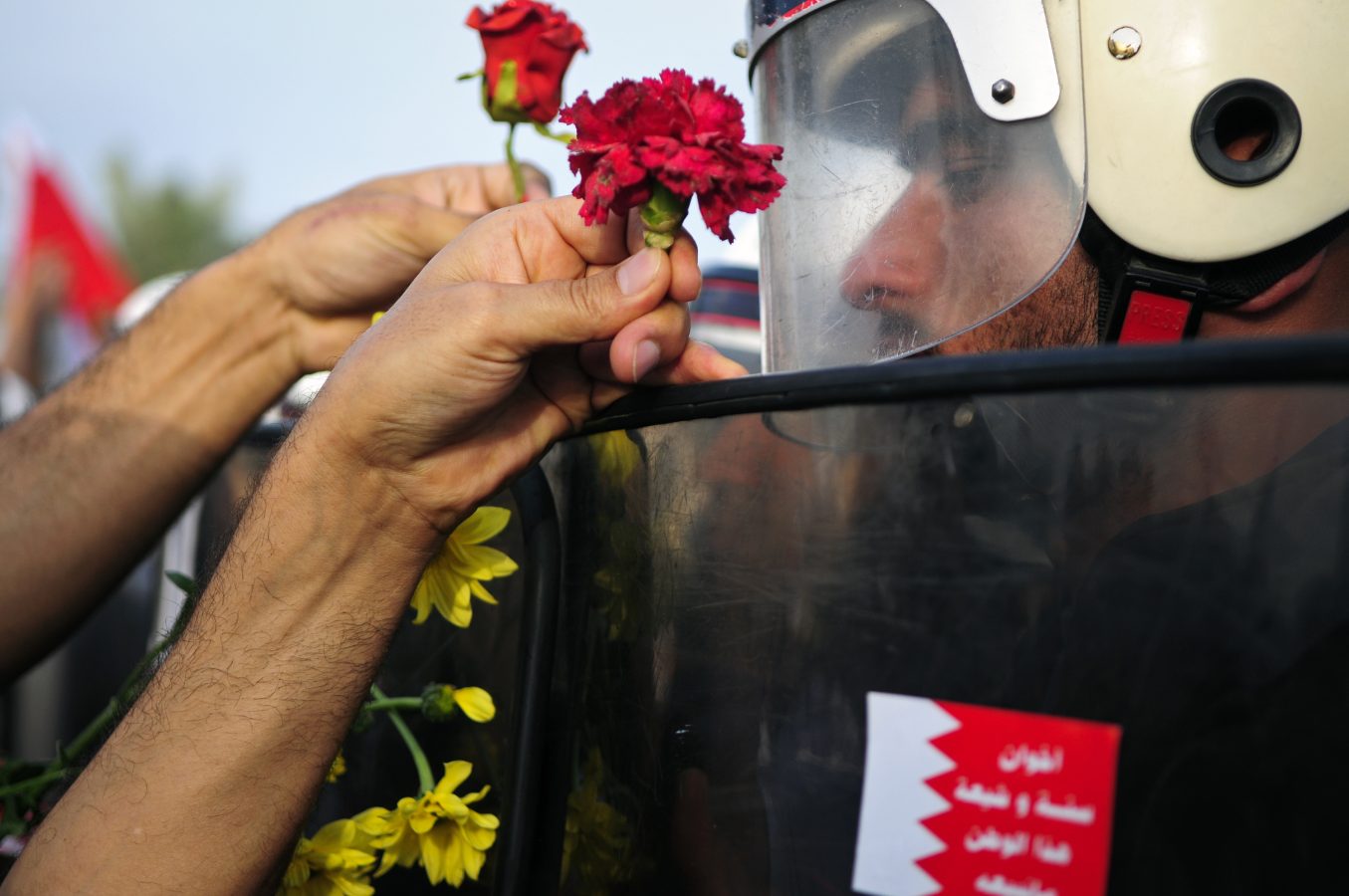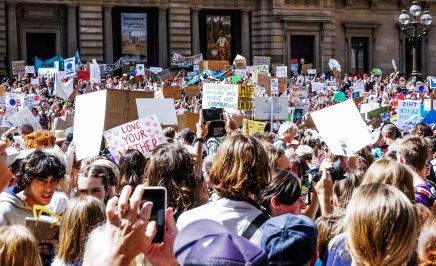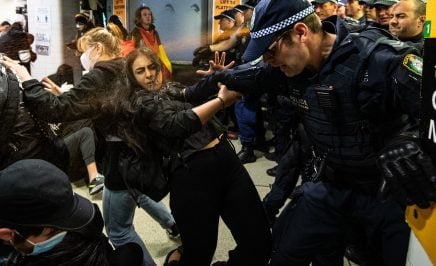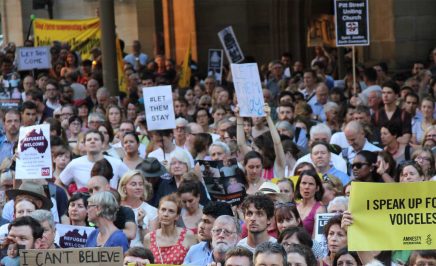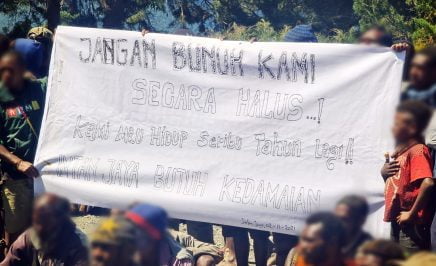All around the world, right now, peaceful protestors are being imprisoned, threatened, and face physical violence from authorities. Even at home, in Australia, our right to stand up and speak out against injustice is being taken away. Now more than ever, it’s essential we continue to fight for our human rights.
The right to protest is a fundamental human right. Article 20 of the Universal Declaration of Human Rights states that everyone has the right to freedom of peaceful assembly and association. The right to protest is a way for people to defend their human rights and the rights of others when they’re threatened by governments and authorities.
Here are five places where the right to protest is currently at threat:
1. Australia
Right here in Australia, governments and authorities are adopting an increasingly punitive attitude towards protestors. In 2020, peaceful protestors at a Black Lives Matter rally in Sydney were met with excessive and unnecessary force from New South Wales Police. Police used pepper spray and chased student protestors on horseback at the University of New South Wales, and pushed them to the ground. Both protestors and bystanders were injured in the process.
The following year, in November 2021, a climate activist was sentenced to 12 months in jail after he climbed atop a coal train and stayed on it for five hours to protest Australia’s climate policies. Twenty-eight other people belonging to the same activist group were also arrested in NSW that month.
This year, in 2022, the NSW Government announced that disrupting any bridge or tunnel in Greater Sydney as part of a protest would result in individual fines of $22,000. This is a ten-fold increase from the previous penalty of $2,200. The NSW Government also plans to introduce legislation which would mean this $22,000 fine would also apply to protestors disrupting roads and public transport facilities.
2. Hong Kong
In June 2020, a new law came into effect in Hong Kong, referred to as the National Security Law (NSL). What “national security” refers to in this law isn’t well defined, and the NSL has been applied arbitrarily at the discretion of the government and authorities to suppress dissent and political opposition.
In September 2021, a human rights lawyer named Chow Hang-tung was arrested under this law and charged with “inciting subversion.” She faces up to ten years in prison for peacefully commemorating the 1989 Tiananmen Square protest crackdown. During the 1989 crackdown, an undisclosed number of people, anywhere from hundreds to thousands, were killed by authorities for gathering to protest the government’s censorship laws. At least three other activists were arrested along with Chow Hang-tung in relation to the peaceful memorial of these victims.
3. Cambodia
In May 2021, three young activists belonging to a Cambodian environmental campaign group called Mother Nature Cambodia were convicted to between 18 and 20 months in prison. They were arrested after they announced a plan to undertake a two-person march to the Cambodian prime minister’s house in order to express their concerns regarding plans to privatise and develop the largest remaining lake in the country’s capital city. They were charged with “incitement to commit a felony or disturb social order.”
Mother Nature Cambodia have won several major environmental victories in Cambodia. In 2016, their efforts to expose widespread environmental destruction and human rights abuses linked to the mining and export of sand from coastal areas of Cambodia resulted in a total export ban on coastal sand from the country. As a result, the group have been targeted with harassment and repression from the Cambodian government. Multiple other activists have been charged with “incitement,” and the group has been accused of “causing chaos in society” and labelled “illegal” because they’re not registered under the country’s restrictive NGO Law.
4. Russia
The right to protest in Russia has been severely compromised since 2004, when the Federal Law on Assemblies, Rallies, Demonstrations, Marches and Pickets was passed. The Law on Assemblies restricts who’s allowed to organise a protest and where the protest is allowed to be held, and subjects planned protests to a strict authorisation process that often results in permission being denied.
Since 2004, legislation has been tightened numerous times. Most recently, the Russian government introduced new, heavy penalties for anyone who protests Russia’s invasion of Ukraine. Less than three weeks after the beginning of Russia’s invasion of Ukraine on 24 February 2022, almost 15,000 peaceful protestors had been arrested. Russian authorities have arrested bystanders of protests and even children. Police have used excessive force against peaceful protestors, including women, subjecting them to beatings and electrocution with stun guns.
5. India
In India, draconian laws such as “the crime of sedition” have been repeatedly used against peaceful protestors, journalists and human rights defenders. The slow investigative processes and strict bail conditions under these laws mean that activists and others who speak out against injustice in their country may spend many years behind bars while their trial is ongoing.
In 2021, a 22-year-old environmental activist named Disha Ravi was charged with “sedition” for sharing an online Google document that was originally tweeted by Greta Thunberg. The document was a basic “toolkit” for farmers in India who were then in the midst of protests against the Indian government over newly introduced agricultural legislation. The “toolkit” included information on the protests and how to support the movement, both in person and online. Disha is a leader of India’s Fridays for Future movement, an international student environmentalist movement instigated by Greta Thunberg.
Protect the right to protest
In 2022, protesters are once again taking to the streets to call for freedom, justice and equality. They shouldn’t face injury and fines, just for standing up for their fundamental human rights and what’s right.
Together we can ensure everyone can safely stand up for what’s right.
When courageous people protest, they make the world a better place. We must protect the right to protest wherever it is restricted and whenever it is at risk.
For Write for Rights 2022, we are taking action for brave individuals from 10 different countries, who have all paid a great price for speaking truth to power. We run Write for Rights every year because it works – real change happens when ordinary people come together to take action.
Learn more about Write for Rights. Write a letter, change a life – including yours.
